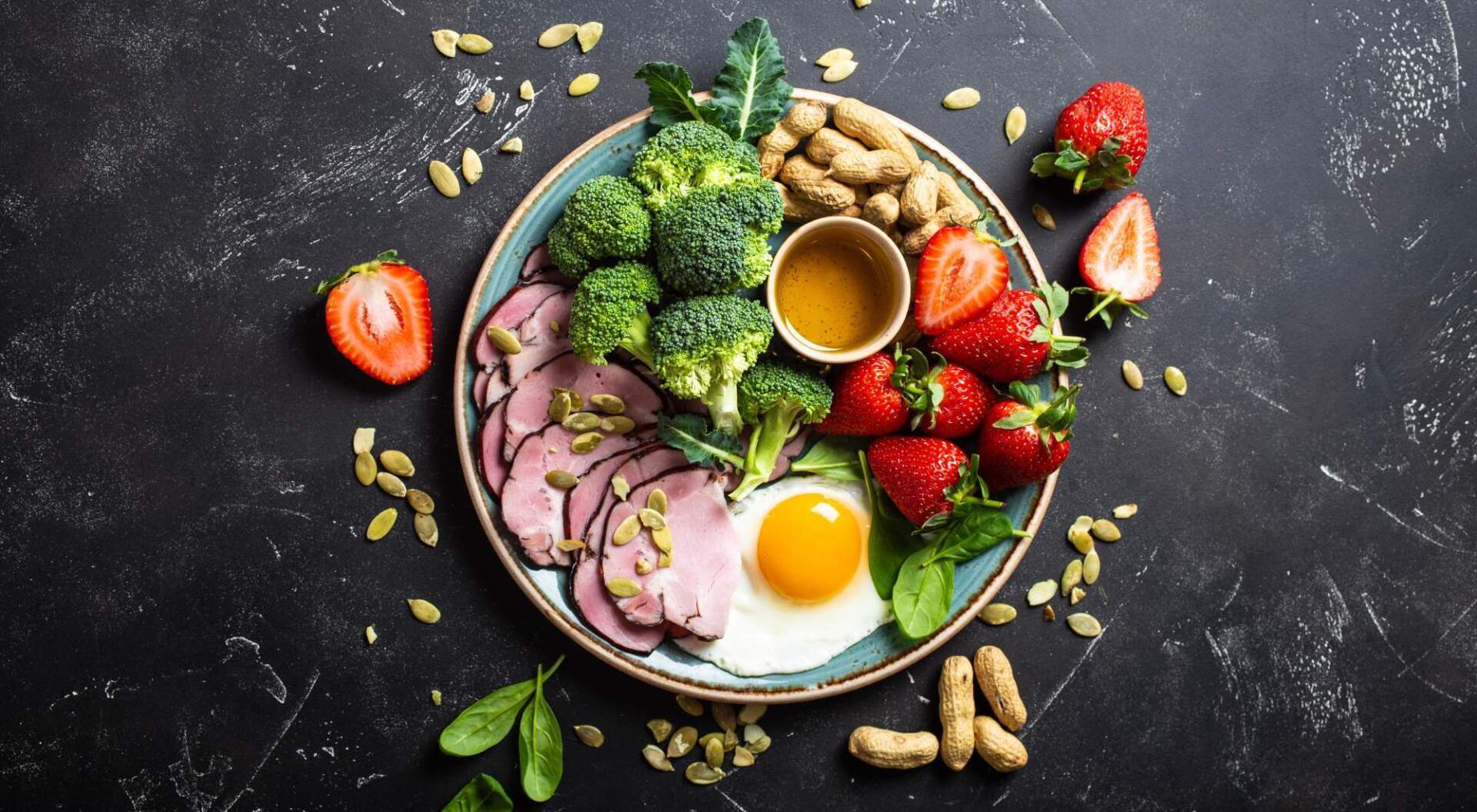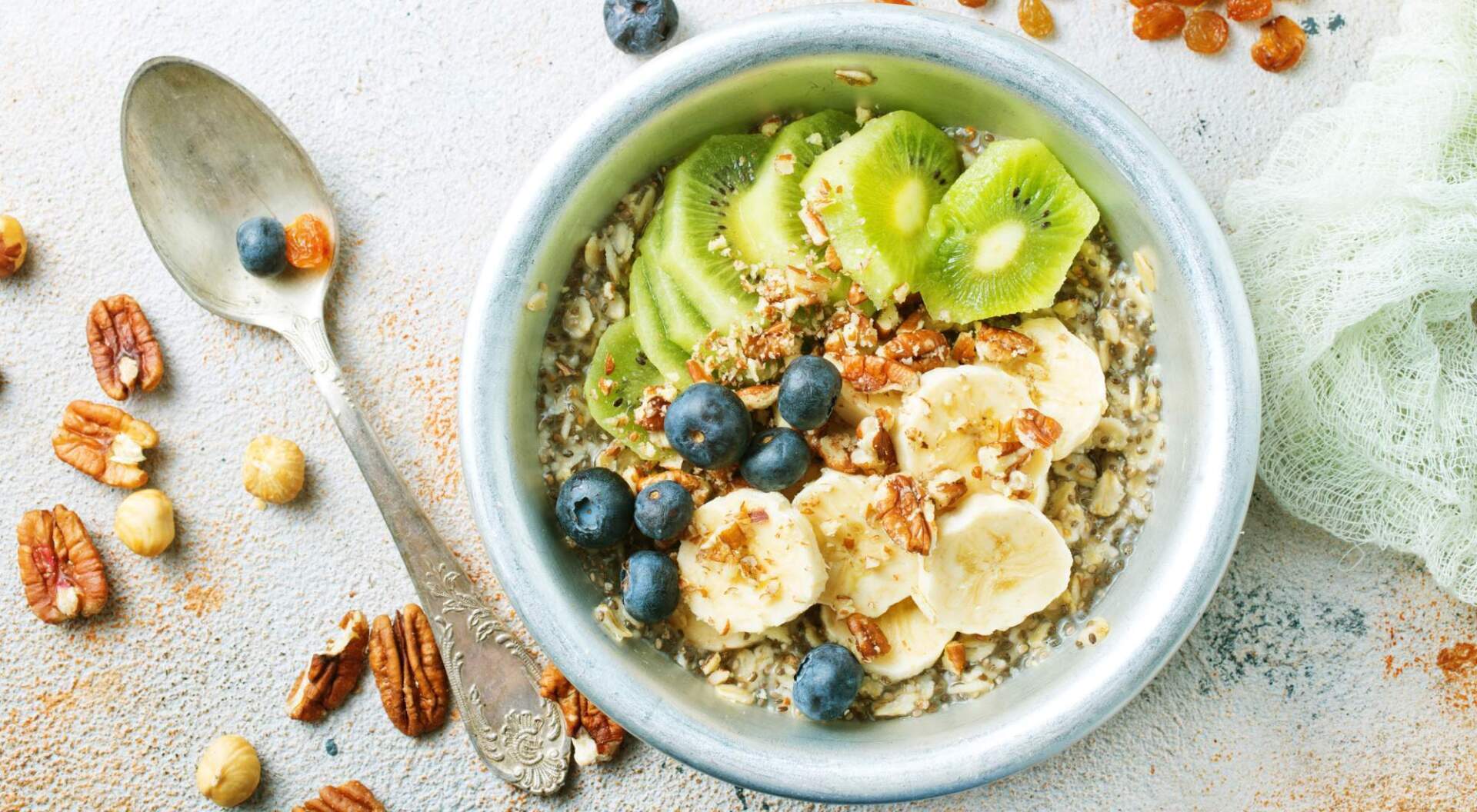Diet and Lifestyle Choices for Balancing Blood Sugars Naturally
"The content below is not intended to be a substitute for professional medical advice, diagnosis, or treatment. Always seek the advice of your physician or other qualified health provider with any questions you may have regarding a medical condition."
High blood sugar is often associated with diabetes or prediabetes, but we’ve all experienced sugar highs and the inevitable crash that follows. Eating sugar feels good at first, but can leave you feeling tired and miserable.
A balanced blood sugar level can:
- Prevent or delay long-term, serious health conditions in people with diabetes
- Improve your mood and energy levels; and
- Curb your sugar cravings
But, can you balance your blood sugar without medications?
The answer is yes, absolutely! In this article, we’ll share how to balance blood sugar naturally through a healthy diet and easy lifestyle changes that anyone can make.
Table of Contents
- Is It Possible To Balance Your Blood Sugar Naturally?
- How To Balance Blood Sugar Naturally: Try Implementing Some (or All) of These 17 Diet and Lifestyle Changes
- How To Stabilize Blood Sugar Naturally Through Diet and Nutrition
- How To Regulate Blood Sugar Naturally Through Lifestyle Changes
- Discover What Your Body Needs to Naturally Balance Blood Sugars Through Nutrition Response Testing With HealthierU
Is It Possible To Balance Your Blood Sugar Naturally?
Not only is it possible to balance your blood sugar naturally, but we also recommend that you take the natural route before adding medications — unless, of course, you have type I diabetes and require insulin.
However, with type I or type II diabetes, managing your blood sugar is crucial and can be done by:
- Managing your weight
- Staying hydrated
- Exercising
- Lowering your stress levels
- Improving your sleep; and
- Making dietary changes
A few small changes can go a long way! But how do you know if your blood sugar levels are healthy?
Common symptoms of high blood sugar (hyperglycemia) are:
- Feeling very thirsty
- Frequent urination
- Blurred vision
- Feeling weak or fatigued
- Losing weight
Prolonged periods of high blood pressure can lead to serious problems. If you’re experiencing the symptoms of high blood sugar you should consult your physician as soon as possible.
In the meantime, taking the time to learn how to maintain your blood sugar levels naturally can have a profound impact on your overall health and well-being.
How To Balance Blood Sugar Naturally: Try Implementing Some (or All) of These 17 Diet and Lifestyle Changes
Seventeen diet and lifestyle changes?! Yes, it seems like a lot.
However, most of the changes you can make to balance your blood sugar are minor, everyday lifestyle changes that don’t require much thought or effort.
We recommend starting with three to four changes at first, and once those become second nature, revisit the list and choose another three to four changes, and so on.
Making small, consistent changes over time can significantly improve your health.
If you have trouble controlling your blood sugar levels, HealthierU, in Brooklyn, NY, can help.
Through a practice called Nutrition Response Testing, Dr. Donna Sergi can help determine any underlying causes that may be contributing to a blood sugar imbalance.
Upon receiving your results, Dr. Sergi will create a customized diet and exercise plan to teach you how to balance blood sugar naturally and improve your health and wellness.
For more information, contact HealthierU today.
How To Stabilize Blood Sugar Naturally Through Diet and Nutrition
#1: Adjust Your Intake of Carbohydrates
Cutting carbs completely is unnecessary and quite frankly, unrealistic for many people. However, studies show that lowering your carbohydrate intake can help manage your blood sugar.
When possible, focus on eliminating or limiting refined carbohydrates, such as candy, bread, or white pasta.
Instead, aim for fiber-rich,
whole-food options like sweet potatoes, fruits, and whole grains. Not only are they better for your blood sugar, but they’re rich in vitamins, minerals, and antioxidants.
#2: Incorporate High-Quality Proteins and Limit Processed Foods
One of the first things you want to do to help balance your blood sugar is to get rid of processed and packaged foods from your diet. As much as possible, you should be focusing on high-quality whole foods, such as:
- Legumes
- Nuts and seeds
- Quality meats
- Veggies and fruits
- Whole grains; and
- Fish
Incorporating high-quality proteins is also essential to stabilizing blood sugars.
Protein tempers insulin secretion, which leads to a gradual rise in your blood sugar after a meal —
rather than a severe spike
— and keeps you feeling full for longer.
#3: Increase Your Fiber Intake
When trying to lower your blood sugar naturally, fiber should be your friend. Fiber slows down the digestion of carbohydrates and sugar absorption, so your blood sugar is less likely to spike after meals.
Adding fiber to your diet is easy. Try including these foods in your daily meals:
- Leafy greens
- Beans and lentils
- Avocado
- Broccoli
- Artichokes
- Raspberries
- Pumpkin seeds; and
- Oatmeal
#4: Stay Hydrated
Drinking water can help keep your blood sugar in check. Not only does drinking water prevent dehydration, but it helps your kidneys to flush excess sugar out through your urine.
Some
studies have shown that drinking more water lowers your risk of developing type II diabetes.
#5: Watch Your Portion Sizes
Portion control helps regulate calorie intake and promotes weight management, which in turn, helps to balance your blood sugar and prevent blood sugar spikes.
To better manage your portion sizes, try these helpful tips:
- Eat slowly
- Use smaller plates
- Read food labels and know the correct portion size
- Don’t eat at all-you-can-eat buffets
- Measure or weigh your portions
- Keep a food diary
If you’re having trouble losing or maintaining your weight, you should consult your physician.
#6: Educate Yourself on the Glycemic Index (GI) and Choose Foods With a Lower GI
The glycemic index is used to measure how quickly carbs are broken down and absorbed by your body during digestion. This will affect the rate at which your blood sugar levels rise.
The glycemic index (GI) divides foods into low, medium, and high and then ranks them on a scale of 0-100. 55 or less is considered a low-GI food.
Eating low-GI foods can reduce blood sugar levels. Some examples of low-GI foods include:
- Non-starchy vegetables
- Legumes, beans, and lentils
- Oats, barley, and bulgar
- Whole wheat pasta; and
- Unsweetened greek yogurt
#7: Look for Chromium and Magnesium in Your Foods
Micronutrient deficiencies can lead to high blood sugar, such as deficiencies in the minerals magnesium and chromium.
Chromium helps with fat and carb metabolism and aids in blood sugar regulation while low magnesium levels can lead to insulin resistance and decreased glucose tolerance.
Try adding these foods to your daily meals:
- Fruits and vegetables
- Dark, leafy greens
- Whole grains
- Bananas
- Nuts and seeds
- Dark chocolate
- Tuna and lean protein
- Beans; and
- Squash
However, if you already eat a diet rich in chromium or magnesium, supplementing likely won’t be helpful.
#8: Incorporate Regular — Healthy — Snacks
Eating smaller, more frequent meals — including healthy snacks between meals — may help you avoid fluctuations in your blood sugar levels and improve insulin sensitivity.
Try eating three regular meals per day, with healthy snacks in between, such as:
- A handful of almonds
- Yogurt and berries
- Hard-boiled eggs
- Sliced apples with peanut butter
- Cottage cheese
- Veggies and hummus
- Popcorn
- Cheese with whole-grain crackers
- Edamame; and
- Trail mix without candy
#9: Never Skip Breakfast
For diabetics, breakfast really is the most important meal of the day. Not only does eating breakfast reduce the risk of hypoglycemia — when your blood sugar gets too low — it also helps you avoid overeating later in the day if your breakfast is high in protein.
Research shows that a breakfast high in protein leads to fewer glucose spikes than those that have less protein.
The higher your blood sugar, the hungrier you feel.
#10: Keep Each of Your Meals as Balanced as Possible
When planning meals, always try to keep them high in nutrients and low in calories and fat.
Low-carb, low-fat, vegetarian, or vegan options are always an excellent choice, but ideally, you should aim for a 50-25-25 split:
- 50% non-starchy vegetables (spinach or peppers, for example)
- 25% protein
- 25% grains or starches (like beans or potatoes)
Try adding fruits, dairy, and healthy fats (like nuts) to your snacks between meals to maintain your balance.
#11: Incorporate Healthy Fats
Fats act as a cushion to your organs, store energy, support cell growth, and insulate your body. Fats are good — if you’re eating the right fats.
Monounsaturated and polyunsaturated fats are essential to a healthy diet.
Monounsaturated fats include:
- Nuts and nut butters
- Olives and olive oil
- Safflower oil
- Canola oil
- Avocado and avocado oil
Polyunsaturated fats include:
- Oily fish (salmon, mackerel, tuna, herring)
- Flaxseed and flaxseed oil
- Walnuts
- Tofu
- Eggs
- Chia seeds
Saturated and trans fats should be avoided.
How To Regulate Blood Sugar Naturally Through Lifestyle Changes
#12: Maintain a Healthy Weight
Maintaining a healthy weight promotes balanced blood sugar levels and reduces your risk of developing diabetes.
If you are overweight,
reducing your weight by as little as 5% can have a significant effect on blood sugar regulation and reduce the need for diabetes medication.
Eating healthy, balanced meals and exercising regularly can help with weight loss.
#13: Start a Regular Exercise Routine
Speaking of exercise, getting 150 minutes of exercise per week can increase your insulin sensitivity, allowing your cells to use the sugar in your bloodstream more effectively.
Exercise also helps your muscles utilize blood sugar for muscle contraction and energy.
If you don’t have time to add 30 minutes of exercise five times a week, try adding 10 minutes of exercise three times a day.
This can be as simple as taking a walk or doing 10 minutes of stretching.
#14: Implement Stress Management Tools
Stress can have a negative effect on your blood sugar, causing it to rise while insulin levels fall. These disruptions can last up to eight hours.
Getting a handle on your stress, by practicing relaxation techniques such as yoga or meditation can help. Or, you can try breathing exercises, dancing to your favorite song (bonus exercise time!), or taking a bath.
#15: Monitor Your Blood Sugar Levels
If you’re having consistent blood sugar issues, monitoring may be necessary.
Keeping track of your blood glucose levels will help you better manage them. You can use a blood glucose meter before and two hours after a meal and this will help you determine where to make adjustments.
#16: Make Sleep a Priority
A good night’s sleep is not only good for your overall health and energy levels, but it can help balance your blood sugar levels as well.
Sleep deprivation can affect insulin sensitivity, increase appetite, promote weight gain, and raise cortisol levels, which plays an essential role in blood sugar management.
The
National Sleep Foundation recommends at least seven to eight hours of quality sleep per night for adults.
#17: Consider Adding a Probiotic to Your Daily Routine
Adding probiotics to the diet has been shown to lower fasting blood sugar and insulin resistance in people with type II diabetes.
Consuming multiple species of probiotics for at least eight weeks can improve blood sugar levels. Probiotic-rich foods include:
- Kefir
- Tempeh
- Kimchi
- Sauerkraut; and
- Yogurt that contains live active cultures
Discover What Your Body Needs to Naturally Balance Blood Sugars Through Nutrition Response Testing With HealthierU
At HealthierU in Brooklyn, NY, Dr. Donna Sergi has worked with many patients struggling with blood sugar imbalances.
Through Nutrition Response Testing, Dr. Sergi will determine the root causes of your blood sugar issues and customize a holistic nutrition and exercise plan that will help get you back on track.
If you’re not sure how to balance blood sugar naturally or are having a hard time knowing exactly where to begin, let HealthierU help.
Contact us today to schedule your consultation at our office in Brooklyn, NY.






